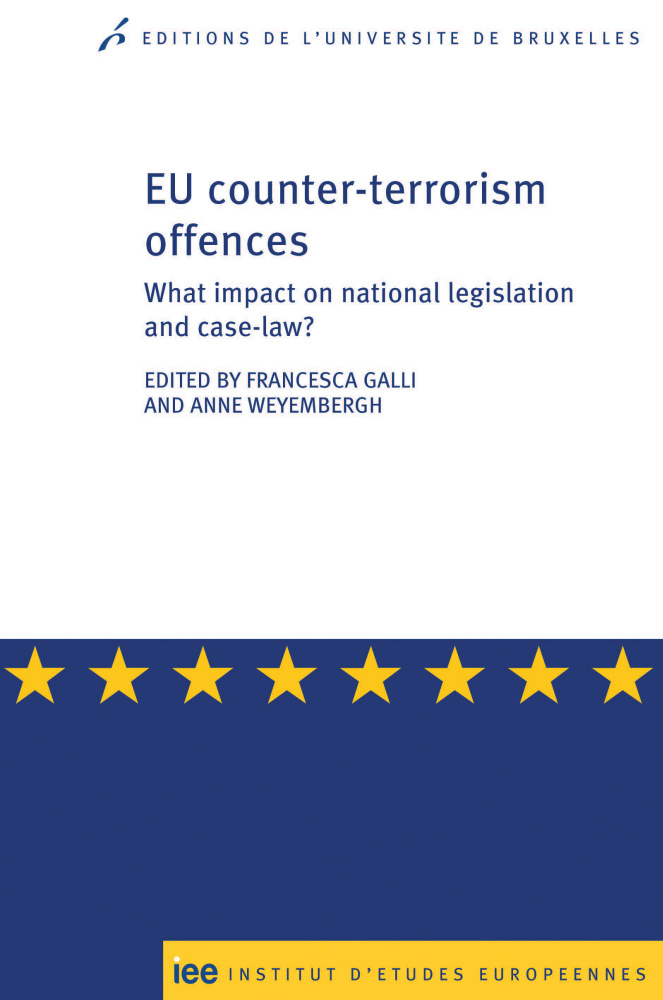De l'égalité à la pauvreté
Une socio-histoire de l'assistance en Belgique (1895-2015)
Première édition
To several governments, modern international terrorism cannot be handled adequately within the ordinary criminal justice system. To fight terrorism (including the criminalization of certain “abstract danger”, preparatory activities such as terrorist training, membership in a terrorist organization) more effectively, criminal law had to be adapted. Lire la suite
National legislation has evolved against the background of international and European instruments. This collective book presents and discusses the latest counter-terrorism policies at the EU level, and particularly instruments for approximation in the field, namely the Framework Decision 2002/475/JHA on combating terrorism and the Framework Decision 2008/919/JHA amending the previous one. The objective is, in particular, to evaluate the impact of the introduction of a EU definition of terrorism and the three new offences of provocation, training and recruitment for terrorism purposes on the development of substantive criminal law and case law of selected EU Member States.
Following an introduction and a general critical assessment of both Framework Decisions, the first part will be devoted to the interplay between these two EU instruments and national provisions, including a study of the relevant domestic case law. Nine Member States (France, Germany, Italy, Spain, UK, Austria, Belgium, Denmark and Hungary) have been selected in order to ensure a balanced representation and particularly the division between two groups of States. The first group is made of few jurisdictions that have experienced serious and long-lasting periods of political violence and terrorism, developed specific terrorist offences and have been influential in providing a model for shaping a common European counter-terrorism strategy. The second group encompasses States that have defined terrorist offences as autonomous ones in their penal codes only when required by the 2002 Framework Decision on combating terrorism. A second and briefer part looks at the influence on European cooperation of the two relevant EU framework decisions harmonizing the terrorist offences. A third and last part is entirely dedicated to the issue of the shift towards prevention in the fight against terrorism and gathers several crosscutting reports for this purpose. The book ends with a transversal and analytical conclusion.
This book is the result of the collaboration of an international team composed of academics and researchers who are members of ECLAN (European Criminal Law Academic Network) as well as national and European experts who « practice » the relevant EU instruments on a regular basis.
Spécifications
- Éditeur
- Éditions de l'Université de Bruxelles
- Auteur
- Daniel Zamora Vargas,
- Collection
- Sociologie et anthropologie | n° 18
- ISSN
- 25935895
- Langue
- français
- Mots clés
- Covid-19, Démocratie
- Catégorie (éditeur)
- > Sociologie & Anthropologie
- BISAC Subject Heading
- SOC026000 SOCIAL SCIENCE / Sociology
- Code publique Onix
- 06 Professionnel et académique
- CLIL (Version 2013-2019 )
- 3080 SCIENCES HUMAINES ET SOCIALES, LETTRES
- Subject Scheme Identifier Code
- Classification thématique Thema: Sociologie : travail et mains d’œuvre
Livre broché
- Details de produit
- 1
- Date de publication
- 30 mars 2023
- ISBN-13
- 978-2-8004-1732-5
- Contenu du produit
- Text (eye-readable)
- Ampleur
- Nombre de pages numérotées : 162
- Code interne
- 1732
- ONIX XML
- Version 2.1, Version 3
Site web
- Details de produit
- 1 HTML
- Date de publication
- 29 décembre 2023
- ISBN-13
- 978-2-8004-1861-2
- Contenu du produit
- Text (eye-readable)
- Code interne
- 1861
- DOI
- 10.3917/udb.bourg.2023.01
- ONIX XML
- Version 2.1, Version 3
Google Livres Aperçu
Sommaire
Introduction
Revenir sur la gestion de crise menée pendant deux ans Dresser un bilan et tirer les leçons pour l'avenir
À la recherche du temps (de crise) perdu
Partager les fruits du Labovir-IUS
Chapitre 1 - Parlementarisme et Covid-19
Aux origines : le règne de la loi
Le droit « Covid-19 » (phase I) : le règne de
l'arrêté ministériel
David contre Goliath
Le droit « Covid-19 » (phase II) : le règne de l'arrêté royal La « loi pandémie », hara-kiri parlementaire
Le chagrin des Belges
Chapitre 2 - Fédéralisme et Covid-19
Aux origines : le principe de l’exclusivité des compétences Le droit « Covid-19 » : le shopping juridique
Le couvre-feu
Le Covid Safe Ticket
Le chagrin des Belges (bis)
Chapitre 3 - Démocratie et Covid-19
L’État s’emballe
L’État punit
L’État divise (activement et passivement) L’État sacrifie les jeunes
Conclusions - L'État belge a-t-il le covid long?

